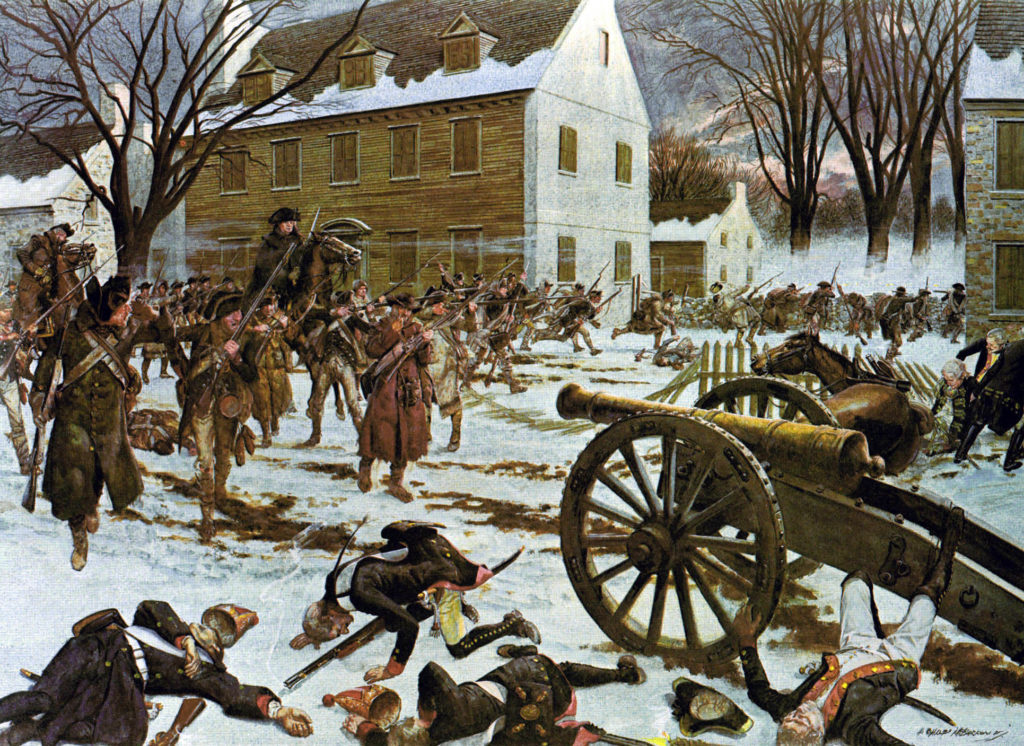
Considering the physical toll of the crossing and the march to Trenton, and with George Washington’s troops at or near exhaustion, how did Hessian Colonel Johann Rall and the 1,400 soldiers who occupied Trenton lose the city on December 26, 1776?
The short answer: it wasn’t fortified.
Even though Rall apparently was warned of the impending attack, he chose to simply lie in wait.
“The failure of the Hessians to defend Trenton is directly attributable to Rall,” says Pat Seabright, a historical interpreter at Washington Crossing Historic Park.
At the time of the attack, Rall was 50 years old, and he’d already accumulated 36 years of experience in the Hessian army. He was an accomplished soldier, but he was unrefined in most other aspects of his life, including his social and professional interactions. He was, however, revered by those who served under him because he consistently stood up for his soldiers and treated them with empathy, according to author David Hackett Fischer.
“In fact, as Rall lay dying after the Battle of Trenton, he was visited by Washington. Rall asked him to treat his men with humanity,” Seabright says. “Washington said he would, and he held true to his word.”
Rall’s superiors were less fond of him. Most of the highest-ranking Hessian officers were younger aristocrats with far less military experience than Rall. They despised him for his crudeness and outward lack of respect for their authority, according to Seabright.
When British General William Howe decided to end their campaign and shelter for the winter, he created a chain of 17 outposts across New Jersey, including three along the Delaware River in Burlington, Bordentown, and Trenton. Thirty-six-year-old Colonel Carl von Donop was given the overall command of the Delaware River posts. And Rall was appointed commander of Trenton, which was considered a position of honor.
Von Donop didn’t like Rall, and Rall didn’t like von Donop. It should come as little surprise that when von Donop ordered Rall to erect redoubts and fortifications around Trenton, which was considered the most exposed of the three Delaware River outposts, Rall ignored him.
Rall’s disdain for the Continental Army, which he’d already defeated several times by that point, also influenced his behavior, Seabright says. To her point, Rall was quoted as saying about the Americans: “Let them come. We will go at them with the bayonet.”
However, soon after Rall’s arrival in Trenton on December 12, his troops found themselves under constant perimeter attacks from the New Jersey-based Hunterdon Militia and General James Ewing’s Pennsylvania Militia, which was stationed directly across the river.
“Despite his bluster, Rall was becoming increasingly nervous about all the guerrilla activity, to the extent that he ordered his men to start sleeping in their uniforms with their weapons at the ready,” Seabright says.
Rall also sent messages to von Donop and General James Grant, the British commander of New Jersey, asking for help. “He said the attacks were increasing, his men were exhausted, and Trenton was indefensible,” Seabright says. “Grant replied with open contempt, believing that Rall was exaggerating the danger and refused to send help. And von Donop had problems of his own.”
Ultimately, the brunt of the burden shifted back to Rall. On Christmas Day, he received warning of an impending attack from a civilian.
“For reasons known only to him, Rall still felt that he could defeat the Americans in an open attack,” Seabright says. “‘Let them come,’ he said.”

